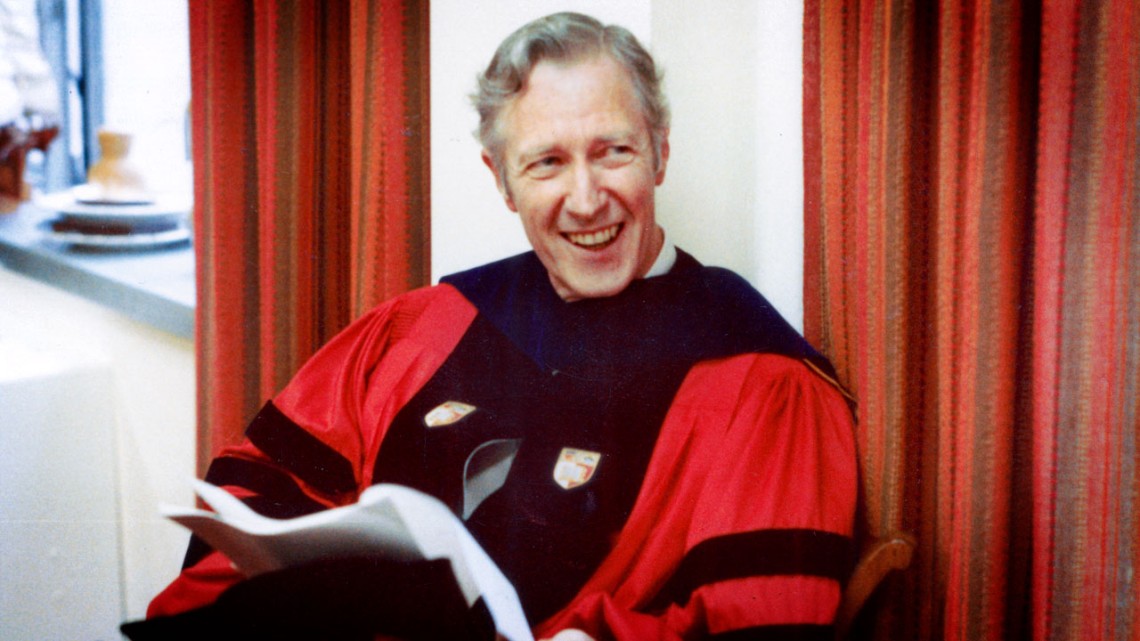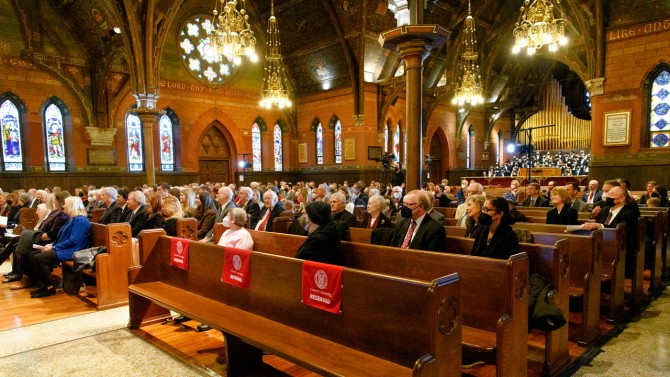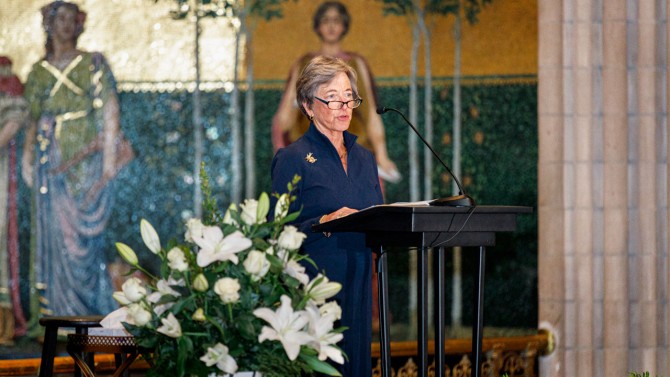
Frank H.T. Rhodes.
Family, friends recall Frank H.T. Rhodes’ warmth and grace
By Blaine Friedlander
A little more than two years after the death of Frank H.T. Rhodes – Cornell’s ninth president, beloved for his leadership, eloquence, intellect and creativity – his family and hundreds of friends gathered March 26 at Sage Chapel to celebrate his life.
Rhodes, who served as president from 1977 to 1995, died Feb. 3, 2020, in Bonita Springs, Florida, at age 93, only weeks before the university closed campus due to the COVID-19 pandemic.
“Cornell senior vice president William Herbster once commented that there was nothing worse for a speaker than following Frank Rhodes,” President Martha E. Pollack said. “He set the bar so high that no one could possibly come close. He knew something about everything and he could be eloquent about anything.
“But while following Frank as a speaker might have inspired terror, following him as a president only inspires admiration and endless gratitude, because Frank did more for Cornell than I can begin to list.”
Susan H. Murphy ’73, Ph.D. ’94, former vice president for student and academic services, began the celebration by remembering Rhodes’ belief in the importance of a liberal education and how he elevated Cornell as one of the world’s most-respected research institutions – as well as his warmth and humanity.
“Frank had the incredible ability to make each of us feel as if we were the only person in the room when he talked with us,” Murphy said, “even though there were scores of people waiting for that very same experience.”
‘Gentle, compassionate footprint’
The Rhodes family, including Rhodes’ wife Rosa, and daughters Catherine R. DeMason, Deborah Rhodes, M.D. ’92, Jennifer McKendree and Penny McDonald '84, sat in the chapel’s front pew. Deborah Rhodes spoke on behalf of the family.
To her father, nothing was disposable. “Everything, every creature and every person he encountered had worth to be appreciated and nurtured,” she said. “He left the most gentle and compassionate footprint upon this earth. Indeed, the only things we ever saw him consume in excess were books, cricket scores and Mozart – played at very high volumes if my mother happened not to be home. Even his favorite Cadbury chocolate was savored one square per night.”
Deborah Rhodes recounted her father’s scholarship, his books on fossils and the Earth, and his lifelong devotion to environmentalism – which stemmed from his modest sensibility. She spoke of her father offering kindness, once paying the tuition of a student whose own father had lost a job, and visiting an elderly Dean Waldo Malott, the sixth president of Cornell, most Sundays until Malott died at age 98.
Frank Rhodes was devoted to Rosa and their four daughters. “Rather than part with us during prolonged summer geologic field studies, we crossed Europe and the United States together, happily hunting alongside the graduate students for fossil fish and trilobites,” Deborah Rhodes said. “’Girls, look at those magnificent Paleozoic strata,’ he would call out in amazement, as our station wagon flew past rock formations across the West.”
Deborah Rhodes said that her family was made better by his focused attention, his daily investment in our well-being and potential.
“From the moment that attention first alighted on my mother [Rosa],” she explained, “he was forever her devoted partner. His nickname for her was ‘Est,’ as the suffix for all superlatives. In his eyes, she was unparalleled. He made her Earl Grey tea every morning of their married life and would jump up to help with any chore or errand before she even had time to ask.
“However extraordinary he seemed on a public stage, he was a million times more up close,” she said.
‘Noses in, fingers out’
By the time Bob Harrison ’76 became a Cornell trustee in 2002, Rhodes had retired from his 18-year presidency. “The reality is that Frank never left Cornell,” said Harrison, chair of the Cornell Board of Trustees. “For the quarter century after technically retiring, he maintained and continued to cultivate lifelong bonds with literally thousands of Cornell faculty, staff, students and alumni – including me. He was the single most effective and beloved ambassador the university has ever known.”
As chair, Harrison told the gathering that he and all trustees adopted a leadership phrase that Rhodes had coined in the late 1970s: “Noses in, fingers out.”
“Frank had a crystal-clear view of the role of the president and the role of the Board of Trustees,” Harrison said. “The president leads the university and must be held accountable by the board. The trustees govern, but don’t manage. They stick their noses in to inquire, but they keep their fingers out of execution. They are supportive, not meddling.”
Before introducing a video paying homage to Rhodes, he told those assembled: “Frank was effortlessly charming, humble and affable, brilliant and eloquent with a mesmerizing British accent and wavy silver hair,” he said. “While he looked like he could have come straight out of central casting for a film about a university president, he was also the real deal: the perfect embodiment of Cornell. Frank Rhodes was truly everyone’s president.”
The early evening program featured interludes of music performed by organist William Cowdery ’73, MA ’81, Ph.D. ’89, music director at the First Congregational Church of Ithaca, and by Annette Richards, Given Foundation Professor in the Humanities in the Department of Music and university organist.
The Cornell Chorus and the Cornell Glee Club, under the direction of Sarah Bowe, visiting lecturer in the Department of Music, performed Mozart’s “Ave Verum Corpus,” accompanied by Cowdery.
‘Kindest eyes’
Rhodes touched many lives, as Thomas W. Jones ’69, Ezra Cornell ’70, and Glenn C. Altschuler, MA ’73, Ph.D. ’76, rose to remember.
At the memorial, Cornell, a trustee for life, recalled the first time he met Rhodes. “Frank walked into the boardroom of the medical college in New York City that day with a strut, shoulders back, a huge broad smile with the kindest eyes, sporting a blue suit, a white shirt, and of course and occasion-appropriate [Cornell] red tie,” Cornell said.
“I immediately knew that this was the man and that there was a bright new dawn ahead for Cornell. Frank was the perfect choice for president – totally remarkable and outstanding,” he said, explaining that alumni were discouraged about a malaise on campus in the late 1970s. “Frank would have to bring vision, creativity, leadership and thinking beyond the moment.”
Rhodes elevated spirits and inspired performance, said Jones, a trustee emeritus. He was warm, gracious and “he had indefatigable energy, which never waned noticeably during his long work days.”
“Frank Rhodes was blessed with what Aristotle called magnanimity, which is greatness of soul,” Jones said.
Altschuler, the Thomas and Dorothy Litwin Professor of American Studies (A&S), said: “Frank H.T. Rhodes, blessed with a grace that was simple, spiritual, unstinting and seasoned with a rich, resonant and oh-so English voice, could elevate even the most prosaic phrase about the weather,” he said.
As Rhodes grew older, Altschuler said, the former president grew more accessible and remained gracious. “Frank Rhodes lived a long, extraordinarily productive and fulfilled life,” he said. “He lives on, as Deborah said so eloquently, as we remember and celebrate his outsized impact on the eternal challenge of improving our world and making ourselves better than we are.”
‘A standard to follow’
Hunter R. Rawlings III succeeded Rhodes as president. “Frank was a hard act to follow,” he said. “When I came to Cornell in 1995, it was not to replace Frank, who could not be replaced, but to do my best not to mess up.
“Cornell and Frank were fully identified with each other. There was no separation between them,” he said. “That’s a very rare thing at research universities, which are huge and complex, and none more complex than Cornell.
“Yet Frank achieved such a unity by his integrity, his wisdom and his remarkable ability to express his thoughts with power and clarity, unmatched in public discourse,” he said.
The life celebration ended with Frank Rhodes, in a recording, speaking the words of the traditional Irish Blessing, which he shared with new Cornell alumni at 17 graduations: “May the sun shine gently on your face and may the rain fall soft upon your fields. May the wind be at your back. May the road rise to meet you and may the Lord hold you in the hollow of his hand until we meet again.”
Get Cornell news delivered right to your inbox.
Subscribe


